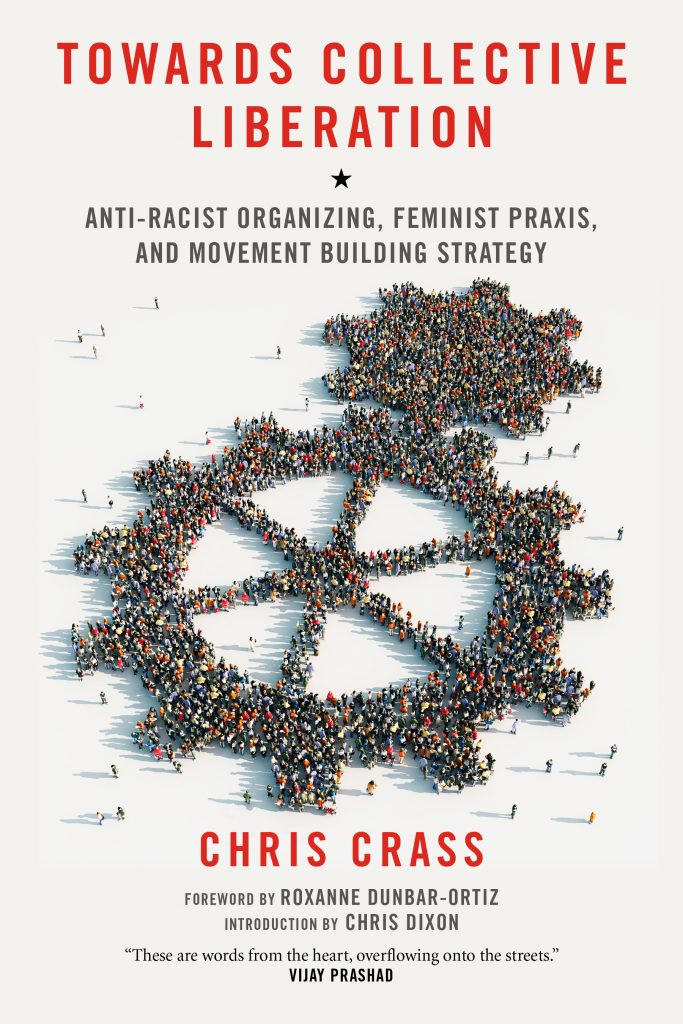
by Sasha
Earth First! Newswire
May 9th, 2013
Towards Collective Liberation: Anti-Racist Organizing, Feminist Praxis, and Movement Building Strategy,
by Chris Crass (PM Press 2013), is a challenging collection of essays
and interviews. The concept of collective liberation, gleaned initially
from radical scholar bell hooks, connotes a struggle lodged deep in the
tradition of liberation movements—black liberation, GLBQTTI liberation,
women’s liberation, and so on. CC insists, “we need liberation movements
of millions of people, from all backgrounds, from all walks of life,
with a wide range of experience, playing many different roles… everyone
reading this book is needed in the process of building the powerful and
successful movements we need to make the changes crucial for our
future.” For liberation movements to connect at crucial strategic and
ideological intersections, activists must overcome the problem by which
“processes of inclusions and exclusions are reproduced in our
organizing.” For collective movement organization to succeed, we need “a
commitment to use different strategies and approaches.” The message of Towards Collective Liberation is that love, openness, and patient determination will prevail. It is an imperative lesson for everyone.
Chris
Crass begins the book with essays steeped in the anarchist tradition:
“there has never been a monolithic anarchist theory, tendency, or
movement throughout history;” he explains, “there is not one anarchism,
but many.” Towards Collective Liberation tells a history of
non-hierarchical organizing throughout the world, leading to the modern
notions of dual power and prefigurative politics exhibited by CC’s
autobiographical discussion of the emergence of the San Francisco Food
Not Bombs. The analysis of Food Not Bombs in San Francisco feels
forthright and sensitive, mixing anti-oppression theory with a
systematic conceptualization of major problems into an easy-to-digest
text with stimulating tastes that travel to the untrammeled recesses of
the heart. Perhaps the decisive declaration of CC’s proposal is to
“imagine and create prefigurative organizing practices that work for
people of different ages, cultures, capabilities, economic classes,
responsibilities, and capacities.” While he does not delve into the more
overarching, systemic critiques of Food Not Bombs, CC’s detailing of
his personal experiences with the difficulties of patriarchy and white
supremacy opens space for “new theorizing and practice.”
Reading Towards Collective Liberation
is a lesson in patience, accountability, and praxis more than a lesson
in Food Not Bombs. “A group can choose to also have anti-racism shape
its politics and practice,” says CC, “but that must be a conscious
decision with a plan for moving it forward… The point is not to become
‘perfect’ but to become praxis-oriented and understand change as a
long-term process.” Chris Crass’s ideation of praxis adapts
decision-making to objectives and experiences within a non-hierarchical
framework, and superbly deployed in several examples and models.
Practical gems, such as the twenty careful steps towards anti-sexist
action, make Towards Collective Liberation a book to pass
around amongst friends as well as a greater organizing and educational
tool. Its simplicity of style, which indicates the diligence of CC’s
writing as well as organizing with the Catalyst Project, will benefit
radical collectives as much as any work place.
The last section of Towards Collective Liberation
is comprised of several interviews with anti-oppression activists
operating in extraordinarily difficult environments. Several members of
the Heads Up Collective discuss the founding labors of collective
organizing. The Rural Organizing Project in Oregon answers questions on
broaching political issues with tact and confidence, while maintaining
the radical patience that it takes to communicate with people on their
level. The thrust of these interviews leads to a kind of acknowledgment
of generalized oppression, and a willingness to transform the social
relations by any (non-violent) means necessary. Kentucky-based
organization, Fairness, puts forward an incredibly interesting example
of equalizing antiracism and anti-homophobia over and against of the
problems that activists face of “divide and conquer,” where a person of
color’s voice is marginalized in the GLBT movement or visa versa. These
interviews provide extraordinarily interesting insights into radical
organizing on a personal level, and Chris Crass is to be commended for
stepping back and allowing other voices to emerge, making the book a
real experience in collective liberation.
Though Earth First! is acknowledged several times throughout Towards Collective Liberation,
the arc of the book avoids the politics of animal and earth liberation.
Because the book focuses directly on liberation movements, themselves,
we do not have stories of the radical ecology movement working towards
earth liberation with an antiracist analysis. If Towards Collective Liberation keeps
biocentric analysis at the periphery, the question remains: are animal
and earth liberation movements peripheral, or should the very problem of
their marginalization within collective liberation struggles motivate
us towards strengthening our absolute commitment towards the collective
liberation of all species. The marginalization of animal and earth
liberation movements is not simply a symptom of a Popular Front style of
organizing; it is a serious problem within the movements themselves
(ie, self-marginalization) that must be openly discussed in order to
ensure that our movements stand unequivocally with other movements for
collective liberation.
I caught up with Chris Crass by email, and he was kind enough to answer a few questions about non-anthropocentric liberation.
Towards Collective Liberation (of all species): An interview with Chris Crass
“There
is no doubt that environmentalists need more training on
antioppression, but do you think that earth and animal liberation
thought have a place in collective liberation as well?”
Absolutely.
Earth and animal liberation both bring critically important insights,
visions, strategies and ethics for the world we want to live in, the way
we live in harmony with all life, and how we can take steps here and
now to get there. Animal liberation was actually really important to my
early activism. Going vegetarian was a concrete way I could practice my
politics and animal liberation was an important gateway for tens of
thousands of young people to come into radical politics.
I moved
away from animal liberation as a central part of my politics as I
focused more on systemic inequality in capitalism, white supremacy,
patriarchy, and imperialism. I did that because I found that many with a
central focus on animal liberation regularly ignored or trivialized
struggles in working class communities and communities of color.
Nevertheless, I do think that animal liberation is important in an
overall collective liberation vision, and when we talk about a socialist
and cooperative economy and society, ethics of animal liberation should
be part of that vision.
“What can animal and earth liberation
groups do in their own hermetic (protesting HLS, for instance) to gain
recognition within the broader CL analysis as more than a marginal
opinion-oriented ideology—as part of the general movement for collective
liberation?”
I worked closely in the 1990s with many who had a
strong animal liberation and earth liberation politics. A significant
split happened at the time of the global justice movement following
Seattle in 1999. There were those who held an animal and earth
liberation politics that largely dismissed and trivialized systemic
inequality and struggles in working class communities and communities of
color. Then there were many who united animal and earth liberation with
a larger vision, analysis and strategy of working for justice for all
people, and the need to build broad-based mass movements of everyday
people.
Many animal and earth liberation activists who went
towards a broader movement orientation to work for collective liberation
joined with the environmental justice movement rooted in working class
communities and communities of color. There are so many incredible
examples of animal and earth liberation activists bringing their
experience with direct action organizing into their community organizing
efforts. The Ruckus Society that trains hundreds of people in direct
action is a great example of this. They went from an almost exclusive
focus on direct action-based environmental struggles and expanded into a
direct action justice struggles-based group that supports communities
of color, Indigenous communities, and working class communities to use
creative and courageous direct action tactics. I believe this is what is
needed.
We need the militant direct action orientation of the
animal and earth liberation movement, but grounded in a larger strategy
and practice of community organizing that is working to build up popular
people’s power to win and create systemic change. Another good example
of the kind of union of earth liberation and liberation for all people
politics is Movement Generation. They are a political education and
movement building group that is putting forward cutting edge analysis
and strategies on how to work for the world we want in the face of
ecological and economic crisis. A good resource on this analysis and
approach is the booklet “Organizing Cools the Planet: tools and resources to navigate the climate crisis” by Hilary Moore and Joshua Kahn Russell.
“What
is the difference between revolution and collective liberation, and is a
popular front-style mass movement the apparatus of collective
liberation (as the cover art seems to suggest)?”
I believe in
the need for revolutionary change. I believe that revolution will
include periods of mass popular uprising and change, but it also needs
to be rooted in everyday struggles to transform conditions and
consciousness in all our communities.
I do not believe that there
will be a mass insurrection that will change everything. We cannot
focus only on demolishing existing institutions of exploitation and
oppression and expect that new liberating institutions capable of long
lasting self-governance will simply emerge. Many anarchists and
socialists have believed and some continue to believe this will happen.
But history has shown, over and over again, that this is not the case.
I
believe in the power of everyday people’s movements as the primary
force for moving our societies towards collective liberation, and
revolutionary politics, vision, and strategy are an important part of
that. I don’t think that revolution is something that will just happen,
and revolution will take care of all our problems. With that thinking we
get into ends justifying the means, because if revolution will take
care of all our problems, then whatever we do to speed up the process of
revolution us justified. A good essay that explores this in more depth,
that is really worth studying is “You Can’t Blow Up a Social
Relationship: The Anarchist Case Against Terrorism”. If we see
revolutionary change as an on-going process, one marked by periods of
mass uprising and popular resistance, then the means of working towards
liberation are actually helping us create the ends we want. Therefore
the values of a liberated society are values we work to live in the here
and now.
Yes we need popular mass movements. Yes we need
revolutionary politics and strategy to help us win and create collective
liberation. Yes, out of everyday people’s struggles, new forms of
social organization will emerge. And yes, we need to actively
incorporate anti-racist, feminist, queer liberationist, socialist values
and politics into our education, organization and institution building,
and our work in our families, communities, and lives as part of an
on-going process of social and personal revolution.
Reviewer Conclusion:
If Towards Collective Liberation challenges
people in the movement to face the problems of patriarchy and white
supremacy, EF!ers will accept and welcome this challenge, while upping
the ante not only by insisting on a safe(r) space to talk about animal
liberation and earth, but by actively working on campaigns for economic,
food, and environmental justice with our allies.
The Earth First! Journal has an antioppression policy, and Earth First! is serious about accountability and antioppression organizing. Towards Collective Liberation will
help EF!ers take the next step in working in rural and urban
environments, and it is time to move forward with the analysis to help
realize collective liberation against anthropocentrism with a biocentric
analysis.






